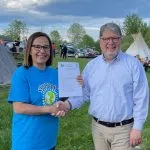
Delivering mental health supports, virtually
An innovative approach to addressing the mental health needs of young people is being explored in the northern community of La Loche.
Virtual reality (VR) is typically associated with video games, but Saskatchewan Polytechnic is harnessing the technology as a way of providing the type of support that is often limited in a small community and more popular with youth.
“There’s a lot of literature saying how telehealth is often not attended to by the patients,” said Lindsey Boechler, Sask Polytech researcher for the Centre of Health Research, Improvement, and Scholarship. “There was a general dislike for telephone appointments because (the youth) don’t know what the person on the other end is doing and there’s a lack of connection.
Researchers found a way to remedy the issue.
“With VR, you put the headset on and you’re fully immersed in an environment,” said Boechler. “You can connect with others knowing they are also fully immersed. It’s a new, innovative approach, and we know some of our past approaches aren’t working, so it’s time to consider new options.”
The project, Sekwe’ha, was launched in fall 2020 in collaboration with Dene High School in La Loche, where Boechler has been working with the community and Elders to find new pathways to supports.
Previously employed as a paramedic in northern Saskatchewan, Boechler said she would often respond to remote communities with limited resources and have to transport individuals in crisis to urban centres that had the appropriate clinicians, sometimes hours away.
“It’s probably not feasible to have these clinicians at every single community, but now we can alleviate some of those barriers and connect people to care in those communities,” she said.
Details on the content of the VR experience is yet to be established, but Boechlers work is scheduled in February with the La Loche community.
Trevor Kolbuc, Principal at Dene High School, said he believes it will resonate with the students because the project is student-driven.
“That’s where the buy-in comes from,” he said. “Students will connect with something better when it comes from them, rather than forced upon them.”
Kolbuc said to make the VR sets as accessible as possible, they will likely provide the students with cardboard glasses to be used with a VR-program on a mobile phone.
Dene High School has two counselors, one part-time mental health therapist, and a once-a-month education psychologist, but not all students feel comfortable talking with someone face to face.
The important thing is students have ease of access and a desire to use it, he said.
“I don’t think it needs to be different, it can be supplementary,” said Kolbuc. “If the students need (support) at home, or on a weekend, they can engage without having anyone around.”
“It might be the jump forward some students need to start engaging in services,” he said. “Maybe that’s a first step, and they realize it helps them, so they start engaging with services.”The important thing is that the students have ease of access and a desire to use it, he said.
“I don’t think it needs to be different, it can be supplementary,” said Kolbuc. “If the students need (support) at home, or on a weekend, they can engage without having anyone around.”
“It might be the jump forward some students need to start engaging in services,” he said. “Maybe that’s a first step, and they realize it helps them, so they start engaging with services.”

